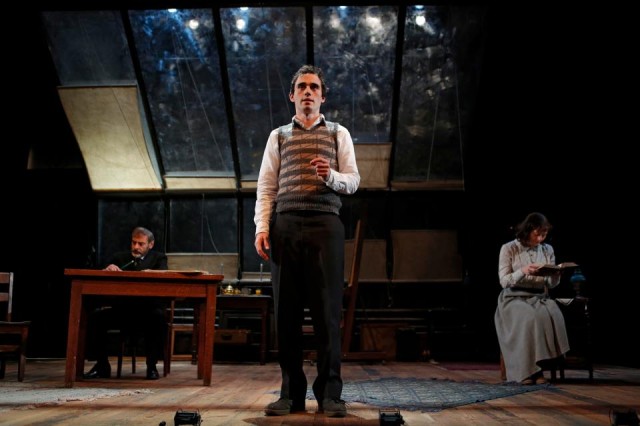
Ari Brand stars as the title character being torn in opposing directions in MY NAME IS ASHER LEV
Westside Theatre
407 West 43rd St. between Eighth & Ninth Aves.
Tuesday – Sunday through May 26, $39-$85
www.asherlevtheplay.com
Aaron Posner’s theatrical adaptation of Chaim Potok’s highly regarded 1972 novel, My Name Is Asher Lev, is a moving, powerful story of art and tradition as a young man tries to find his way in a complex world. The story takes place in 1950s Brooklyn, where Asher Lev (Ari Brand) lives with his father, Aryeh (Mark Nelson), and mother, Rivkeh (Jenny Bacon). From the time he was virtually a baby, Asher has shown a natural talent for drawing, but as he grows up and considers becoming a professional artist, his father, who works for the Rebbe (Nelson), the spiritual leader of the community, is deeply disturbed, afraid that Asher will turn his back on Judaism. Meanwhile, his supportive mother goes through a dramatic change when she suffers a tragic loss. But Asher is in fact determined to become a successful painter while also maintaining his responsibilities as a Hasidic Jew, something that is harder and harder to do as he is mentored by older artist (and lapsed Jew) Jacob Kahn (Nelson) and celebrated by Manhattan gallerist Anna Schaeffer (Bacon), for whom he creates a startling work that threatens to tear his family apart. Directed by Long Wharf Theatre artistic director Gordon Edelstein (The Road to Mecca, The Glass Menagerie), My Name Is Asher Lev insightfully captures the tug-of-war going on inside of Asher. Posner, who has previously adapted such novels as Ken Kesey’s Sometimes a Great Notion and Potok’s The Chosen, tends go get right to the point, without a lot of nuance, but he cleverly steers clear of potential clichés as he develops the characters. Nelson and Bacon are excellent playing a series of roles, while Brand is likable even if a little overly eager and wide-eyed as Asher. At approximately one hundred minutes without intermission, My Name Is Asher Lev is, well, like a good book you can’t put down, an involving tale that raises intriguing questions about family, responsibility, and artistic desire, and it remains ever-relevant today as religions around the world continue to try to balance modern needs with fundamentalist tradition. (On March 28 at 12 noon, the cast will take part in a special conversation at 92YTribeca with New York Drama Critics’ Circle president Adam Feldman and perform excerpts from the play.)